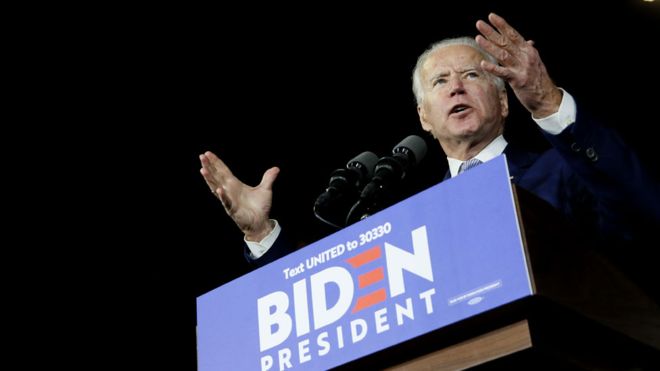Joe Biden has won eight of the 14 states that voted to pick a Democratic White House candidate on Super Tuesday, a remarkable rebound for his campaign.
The ex-US vice-president has swept Massachusetts, Minnesota, Oklahoma, Arkansas, Alabama, Tennessee, North Carolina and Virginia.
But Bernie Sanders is being projected to win the biggest prize of the night, California, and three other states.
They lead the race to face Republican President Donald Trump in November.
How important is Biden's performance?
Virginia and North Carolina are crucial because they are key swing states in the 2020 election.
With all precincts reporting, Mr Biden won about 53% of the vote in Virginia, leaving Mr Sanders a distant second on 23%.
Exit poll data across the board suggests Mr Biden has won large majorities of African-American voters, a crucial bloc for the Democratic party.
Mr Biden also appears to have won convincingly among the type of suburban voters who pollsters say have been turning away from the current US president.
"We are very much alive," Mr Biden told a crowd in Los Angeles. "Make no mistake about it, this campaign will send Donald Trump packing."
How is Sanders doing?
If Mr Sanders does win the liberal behemoth of California, as the Associated Press news agency projects, he will pick up the lion's share of the whopping 415 delegates that the Golden State sends to the party convention.
Super Tuesday awards more than 1,300 of the 1,991 delegates needed to clinch the Democratic White House nomination.
The left-wing independent senator also won his home state of Vermont, along with Colorado and Utah.
All eyes now are on the second biggest voting state of the night, Texas, which was too close to call between the two frontrunners.
But exit poll data shows Mr Sanders has won 45% of the Hispanic vote in the Lone Star State, compared to 24% for Mr Biden.
Partial results from Maine's primary also show it is on a knife edge between Mr Sanders and Mr Biden.
In a victory speech, Mr Sanders lambasted Mr Trump, but also took a shot at Mr Biden.
"We're taking on the political establishment," he said. "You cannot beat Trump with the same-old, same-old kind of politics."
Who were the biggest losers?
Senator Elizabeth Warren, once the frontrunner in the race, has suffered a humiliating defeat to Mr Biden in her home state of Massachusetts.
But arguably the biggest loser of the night was Michael Bloomberg, who spent more than half a billion dollars of his own money but could only pick up a consolation win in the tiny US territory of American Samoa.
The former New York mayor was appearing on a presidential ballot for the first time after skipping all four contests last month.
The billionaire wildcard had lowered expectations for his performance ahead of Tuesday.
On the eve of the vote, he indicated he plans to fight all the way to the party convention in Milwaukee, Wisconsin, in July.
Mr Trump could not resist taking repeated digs at his rival New York billionaire after his disappointing performance.
How did Biden bounce back?
Mr Biden's under-staffed and under-funded campaign has been resurgent since his commanding win in South Carolina's primary at the weekend.
It was the first time the 77-year-old had won any contest in three White House runs (previously in 1988 and 2008).
He was boosted by last-minute endorsements from former rivals.
Amy Klobuchar and Pete Buttigieg, who were also competing for centrist Democratic voters, ended their campaigns this week and threw their weight behind Mr Biden.
Mr Biden credited his win in Minnesota to the support from Ms Klobuchar, who is the Midwestern state's senator. The Sanders campaign had expected to prevail there.
Now Mr Biden aims to consolidate the moderate Democratic vote by barging aside Mr Bloomberg, one of the world's richest men.
What's at stake in Biden v Sanders?The Democratic party is at a crossroads as its voters decide which candidate has the best chance of denying Mr Trump a second term in office this autumn.
Mr Biden, a moderate who served under President Barack Obama, and Mr Sanders, a liberal firebrand, offer starkly different visions for America's future.
The former vice-president presents himself as an electable pragmatist who will bring incremental change and restore "decency" after the Trump presidency.
Mr Sanders' detractors say a self-described democratic socialist cannot win over the swing voters needed to capture the White House.
The 78-year-old is planning to transform the American economy with a multi-trillion dollar, higher taxation blueprint on everything from healthcare to education.
Mr Biden's critics say his campaign is uninspiring, and he brings too much political baggage from his lifelong career as a Washington insider.
Source : BBC





